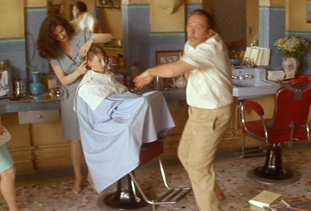
(Oy, a tough week for writing: we're trying to buy a house, I'm in the midst of a huge stack of grading, and I'm in the middle of Jonathan Strange and Mr. Norrell. The first two things are hellish, while the third is immensely enjoyable -- but all three have been distracting me from blogging...)
Over the past couple of weeks I've caught part or all of the following films, mostly on the Sundance Channel.
Paris Blues. This cross-racial jazz buddy film doesn't have the greatest script, but it has great music (the score is by Duke Ellington, and Louis Armstrong shows up as a character and musician in the film itself). It also introduced me to Diahann Caroll, one of the few black actresses who had a successful career in Hollywood in the 1960s and 70s. (See images of her in a series of roles at this fansite). Somewhere on the Internets (I can't find the link) I discovered that Caroll and Sydney Poitier (both married to other people) had had a raging affair before this film was shot, which threatened to undo their respective marriages. But they agreed to work with each other anyways, mainly because their roles in the film are progressive and quite natural (i.e., they are playing people who are more or less ordinary, not criminals or servants). So alongside the (slightly boring) didactic progressivism of the film and its brilliant music, there is a nice gossip element to Paris Blues. One other thing: the shots of Paris are stunning, especially Montmartre and the Seine.
8 Women. This is a very funny French murder-mystery with an ensemble, all-female cast, including Catherine Deneuve, Isabelle Huppert, and Emmanuelle Beart (to name only the three I had heard of). The best parts were the periodic eruptions into song by each of the 8 characters. Francis Ozon seems to have borrowed a page from Bollywood here, though the campy, ironic feel of this film as a whole is very un-Bolly. (Still, it might be interesting to imagine a slightly tweaked Bolly-version of this film... I know Rekha would be up for it...)
The Housekeeper. This is an unapologetic middle-aged man's (misogynistic) fantasy universe: a guy, divorced by his wife, hires a young, attractive housekeeper -- who subsequently throws herself at him. It's a little degoutante as a story, but the film has good performances from both leads and takes an understated, intelligent approach to its subject: they really want to convince you of the plausibility of this affair. Both S. and I were carried along by the film, but annoyed at it as well: just because it's a sophisticated French art movie doesn't mean the premise isn't fundamentally sexist! (Why aren't there more women screenwriters in French cinema?)
The Hairdresser's Husband. This film is a really just a trifle, but it's worth watching chiefly for Jean Rochefort's strange, manic dances to Arabic songs inside his wife's hair salon. You've never seen anything quite like it...
Diamonds and Rust. This Israeli film seems like an unlikely topic for an interesting documentary: the crew of a diamond trawler off the coast of Namibia. But it's all in the material, and these filmmakers have really good stuff. This is worthwhile viewing to anyone interested in how race, language/culture, and money collide in a small space. It's also just interesting to see how a diamond trawler works. (Click on the link for a good summary of the film)
Torture: The Dirty Business. Andrew Gilligan is a controversial figure in British journalism, mainly for his involvement in an Iraq pre-war intelligence scandal that led to the suicide of a government informant (see the full story at Wikipedia). He's also a ferocious left-leaning critic of the British and American governments. This documentary does feel biased at times, but it also has first-hand interviews with numerous victims of the U.S. government's "Extraordinary Rendition" program -- whereby people suspected of involvement in terrorism are flown on private Gulfstream airplanes to places like Syria and Egypt, where they are tortured. The most damning example is Maher Arar, a Canadian citizen who was tortured by the Syrians, kept in a brutal kind of solitary confinement, and then released after a year without charge.
Incidentally, the director of the film, Sarah MacDonald, has an interesting connection to India.